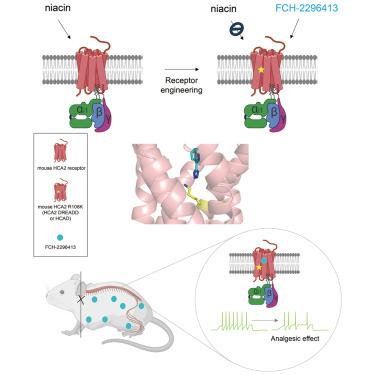Structure-guided design of a peripherally restricted chemogenetic system
IF 45.5
1区 生物学
Q1 BIOCHEMISTRY & MOLECULAR BIOLOGY
引用次数: 0
Abstract
Designer receptors exclusively activated by designer drugs (DREADDs) are chemogenetic tools for remotely controlling cellular signaling, neural activity, behavior, and physiology. Using a structure-guided approach, we provide a peripherally restricted Gi-DREADD, hydroxycarboxylic acid receptor DREADD (HCAD), whose native receptor is minimally expressed in the brain, and a chemical actuator that does not cross the blood-brain barrier (BBB). This was accomplished by combined mutagenesis, analoging via an ultra-large make-on-demand library, structural determination of the designed DREADD receptor via cryoelectron microscopy (cryo-EM), and validation of HCAD function. Expression and activation of HCAD in dorsal root ganglion (DRG) neurons inhibit action potential (AP) firing and reduce both acute and tissue-injury-induced inflammatory pain. The HCAD chemogenetic system expands the possibilities for studying numerous peripheral systems with little adverse effects on the central nervous system (CNS). The structure-guided approach used to generate HCAD also has the potential to accelerate the development of emerging chemogenetic tools for basic and translational sciences.

外围受限化学发生系统的结构导向设计
由设计药物激活的设计受体(DREADDs)是远程控制细胞信号、神经活动、行为和生理的化学发生工具。利用结构导向的方法,我们提供了外周受限的Gi-DREADD,羟基羧酸受体DREADD (HCAD),其天然受体在大脑中表达最低,以及不穿过血脑屏障(BBB)的化学致动器。这是通过联合诱变,通过超大的按需制作文库进行模拟,通过冷冻电子显微镜(cryo-EM)确定设计的DREADD受体的结构,以及验证HCAD功能来完成的。HCAD在背根神经节(DRG)神经元中的表达和激活可抑制动作电位(AP)放电,减轻急性和组织损伤性炎症性疼痛。HCAD化学发生系统扩展了研究许多外周系统的可能性,对中枢神经系统(CNS)几乎没有不利影响。用于生成HCAD的结构导向方法也有可能加速基础科学和转化科学新兴化学发生工具的发展。
本文章由计算机程序翻译,如有差异,请以英文原文为准。
求助全文
约1分钟内获得全文
求助全文
来源期刊

Cell
生物-生化与分子生物学
CiteScore
110.00
自引率
0.80%
发文量
396
审稿时长
2 months
期刊介绍:
Cells is an international, peer-reviewed, open access journal that focuses on cell biology, molecular biology, and biophysics. It is affiliated with several societies, including the Spanish Society for Biochemistry and Molecular Biology (SEBBM), Nordic Autophagy Society (NAS), Spanish Society of Hematology and Hemotherapy (SEHH), and Society for Regenerative Medicine (Russian Federation) (RPO).
The journal publishes research findings of significant importance in various areas of experimental biology, such as cell biology, molecular biology, neuroscience, immunology, virology, microbiology, cancer, human genetics, systems biology, signaling, and disease mechanisms and therapeutics. The primary criterion for considering papers is whether the results contribute to significant conceptual advances or raise thought-provoking questions and hypotheses related to interesting and important biological inquiries.
In addition to primary research articles presented in four formats, Cells also features review and opinion articles in its "leading edge" section, discussing recent research advancements and topics of interest to its wide readership.
 求助内容:
求助内容: 应助结果提醒方式:
应助结果提醒方式:


